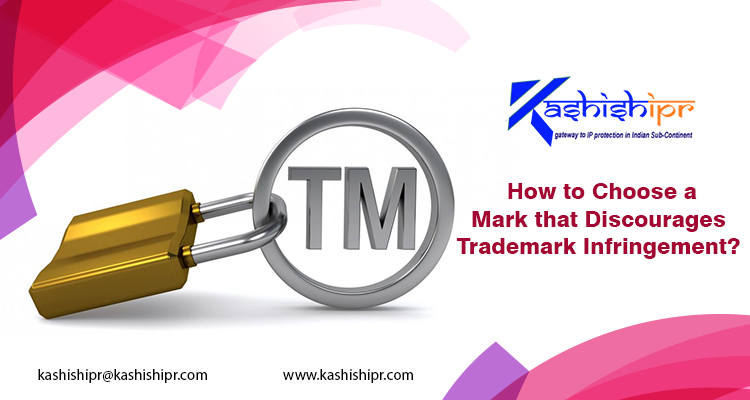How to Choose a Mark that Discourages Trademark Infringement?
 Posted On
Posted On
Is your newly launched product doing well? Do the potential buyers are showing interest in it? Congratulations, as creating a product that attracts the consumers towards your brand while leaving the competitors behind is a big deal. Undoubtedly, products of this kind can serve you with remarkable profits in the form of more customers, better sales, etc., but sometimes, they may become a matter of concern for you. How? Your competitors or others may commence making profits on your name by creating confusion that misleads consumers to purchase their products instead of yours. They can do this by using a name, symbol, or product similar to yours without your consent. Therefore, you should always be cautious about securing your unique product or service under the robust Intellectual Property Protection.
When it comes to the protection of Intellectual Property (IP) like unique products or services, trademark rights appear as one of the most vital sources that can keep the infringers at bay. In general, there are five sorts of trademarks that the owner can use to safeguard his/ her assets. Let’s have a look at all these marks and choose the most appropriate one that provides robust Trademark Protection to your asset.
Five Strongest Trademarks to Keep Infringers at Bay
- Fanciful Marks
Fanciful marks are made-up words and have no meaning other than appearing as a trademark for the owner’s particular goods or services. These marks never tell anything about the products but are memorable as they enable the consumers to identify and remember your product/ mark, no matter how many competitors you have. Fanciful marks ensure the most stimulating Trademark Protection and can be enforced against the use of the same or a similar mark on others’ assets and services. Some examples of fanciful marks are as follows:
- VERIZON telecommunication services
- GOOGLE computer search engine
- ROLEX watches
- Arbitrary Marks
These are those marks that consist of a word, symbol, image, etc., used for entirely different and unrelated products or services. Like fanciful marks, arbitrary marks also have nothing to do with the products or services, but stand out as more memorable when it comes to the same type of assets. That is why people prefer to Register a Trademark of this kind. Arbitrary marks assuredly give exceptional protection but in general, don’t possess as good scope of enforceability as fanciful marks. For instance, the word APPLE might not be enforceable against one using the term APPLE CAFÉ. Nevertheless, if he substitutes the Apple Logo for the word APPLE, then the logo would be enforceable against him. A few other examples of such kind include:
- BANANA REPUBLIC clothes
- GEICO insurance services
- HARD ROCK restaurants
- Suggestive Marks
Suggestive marks are something that gives a hint about the product and services. These marks tell what a particular product is and what it does, but without going deep to describe it. As suggestive marks are just one step away from descriptive trademarks, they are enforceable only in regards to the same or similar mark on the same or similar product. According to the Trademark Law, these marks exist as words or a combination of words or equivalent graphic logos. Examples of suggestive marks are:
- FRESH ‘N CLEAN pet shampoo
- CITIBANK financial services
- 7-11 convenience stores
- Descriptive Marks
A mark that describes the quality or function or aspects of the specific product or service, and explains; what it is or what it does is called a descriptive mark. As this mark is descriptive and has no proprietary rights, it is generally not protectable and not enforceable. If your asset obtains the trademark protection under descriptive marks, anyone in the industry can use the mark wholly or partially, either as the name of his product or a term in the text. Trademarks registered as descriptive include:
- PARK ‘N FLY airport parking service
- COMPUTERLAND computer stores
- RAISIN BRAN cereal
- Generic Marks
A mark or name that due to its significance or popularity has become the generic name for a general class of product or service, often against the intentions of the trademark’s holder is known as a generic trademark or genericized trademark. In other words, when a mark turns so common that it just signifies the type of product, it is deemed as generic and can no longer be secured as a Registered Trademark. Generic marks aren’t trademarks; they are nouns modified by registered trademarks, for example:
- APPLE computers
- GEICO insurance services
- STARBUCKS coffee
Strong marks give you powerful ownership rights, trademark protection, and are easier to enforce. The stronger is the mark, the more are the possibilities that it will be enforceable against others and thus, prevents or stops issues like Trademark Infringement. Such marks are not just less vulnerable to problems during the Trademark Registration Process and filing a Trademark Application but also enforceable against a user of the same or similar mark for the same or similar or relevant products and services. So, whenever you come up with a new product, don’t miss out to secure it with a strong trademark as you have invested a lot of your valuable money, time, and resources on its designing, development, and more. For more visit: https://www.kashishipr.com/
Don’t forget to follow us on social media:
Facebook – https://www.facebook.com/kashishipr/
Twitter – https://twitter.com/kashishipr
Linkedin – https://www.linkedin.com/company/kashishipr/
Pinterest – https://www.pinterest.com/kashishipr/
Tumblr – https://kashishipr.tumblr.com/
